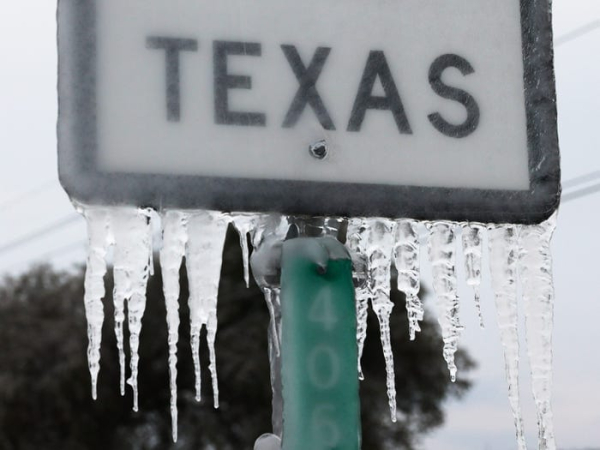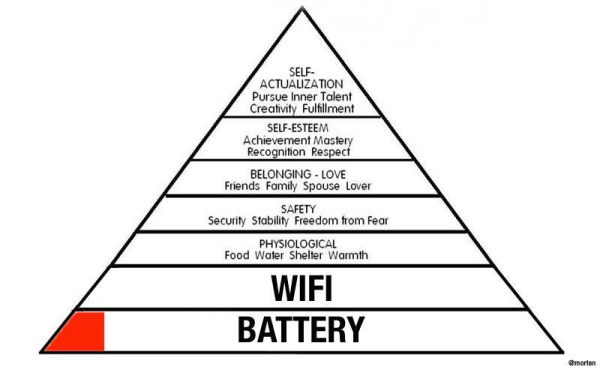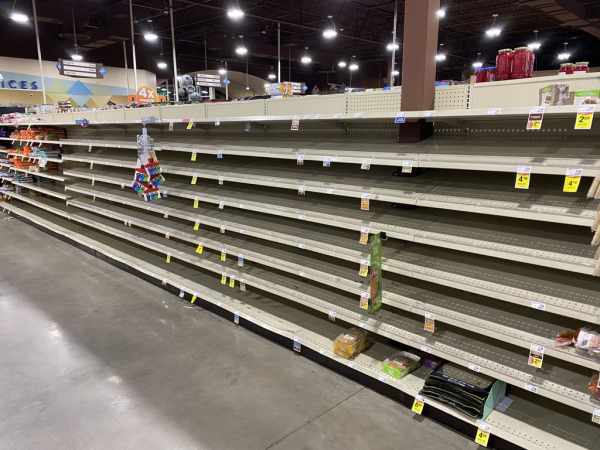As I write this, Texas has already cleared up and is warm again ... but the effects of a week spent below freezing (with temperatures reaching below zero) will be felt for a long time.
 via Joe Raedle/Getty Images
via Joe Raedle/Getty Images
Even though it had not snowed here in for several days, the Rolling Blackouts continued through the end of the week. It is hard to believe Texas does not know how to handle six inches of snow. Having grown up near Boston, I recognize that with no plows, no sanding, and no salt ... you stand little chance of keeping the roads clear. At some level, it is just idiots slipping, sliding, and waiting for the sun to come out. But who would have thought that would describe top leaders of the State and its ability to provide basic human needs like power, water, and heating (let alone WiFi and battery power)?

The ice storm and cold snap weren’t so bad for me (compared to some of the stories I’m hearing from other people in our office). Yes, we lost power, water, and the Internet ... but only for a few isolated hours. I was lucky (and so was our data center), but millions (including several Capitalogix employees) suffered due to lack of water, electricity, or heat, and to add insult to injury – burst pipes.
Despite the fact that the temperature is back in the high 50s, here is a photo I took at our local supermarket this weekend. Let's say things aren't quite back to normal yet.

I've seen a lot of political mudslinging from both sides trying to avoid blame. The reality is that this mess is a disaster that doesn't need to be politicized (and should be used as the raw material to make sure that something like this doesn't happen again). While Texas rarely sees weather like this, this wasn't the first time we have, and it won't be the last.
Two major factors came into play.
First, Texas chose to stay off the national grid to avoid federal regulation. The Texas grid is called ERCOT, and it is run by an agency of the same name — the Electric Reliability Council of Texas. We joke about Texas seceding from the Union, but the reality is that many Texans are fiercely independent and crave less federal regulation (which is a discussion for another day) so the choice resonated with constituents. Especially since Texas is a very energy-rich state. Unfortunately, not being on the national grid means that when our grid is overtaxed, we're mostly on our own. In the winter of 2011, when our power sources couldn't keep up with needs we imported energy from Mexico to keep up, but this year much of Northern Mexico was struggling as well.
Second, Texas chose not to winterize its power sources. After 2011, a proposal was floated to winterize energy plants by adding insulation, heating pipes, etc. but it was very costly and wasn't adopted. Many Texans (including politicians) were quick to blame it on the underperformance of renewables, but in this case, according to ERCOT, natural gas, coal, and nuclear were affected.
All of these energy sources can be winterized, and renewables work fine even in Antarctica. This isn't an argument for renewables or for joining the national grid. Just an acknowledgment of the current situation.
ERCOT claimed that they were ready for the storm, and warned their plants to "winterize" how they could, but clearly, it wasn't enough. With more preparation locally and on the state level, Texans should be fine to handle these types of episodes in the future. With that said, it shouldn't take episodes like this to enact change.
Regardless, crises like this are opportunities to come together, and I've been very happy to see how many people have offered food, water, and their homes to people in need.
Thank you to all who reached out to check in on us.
When Texas Freezes Over
As I write this, Texas has already cleared up and is warm again ... but the effects of a week spent below freezing (with temperatures reaching below zero) will be felt for a long time.
Even though it had not snowed here in for several days, the Rolling Blackouts continued through the end of the week. It is hard to believe Texas does not know how to handle six inches of snow. Having grown up near Boston, I recognize that with no plows, no sanding, and no salt ... you stand little chance of keeping the roads clear. At some level, it is just idiots slipping, sliding, and waiting for the sun to come out. But who would have thought that would describe top leaders of the State and its ability to provide basic human needs like power, water, and heating (let alone WiFi and battery power)?
The ice storm and cold snap weren’t so bad for me (compared to some of the stories I’m hearing from other people in our office). Yes, we lost power, water, and the Internet ... but only for a few isolated hours. I was lucky (and so was our data center), but millions (including several Capitalogix employees) suffered due to lack of water, electricity, or heat, and to add insult to injury – burst pipes.
Despite the fact that the temperature is back in the high 50s, here is a photo I took at our local supermarket this weekend. Let's say things aren't quite back to normal yet.
I've seen a lot of political mudslinging from both sides trying to avoid blame. The reality is that this mess is a disaster that doesn't need to be politicized (and should be used as the raw material to make sure that something like this doesn't happen again). While Texas rarely sees weather like this, this wasn't the first time we have, and it won't be the last.
Two major factors came into play.
First, Texas chose to stay off the national grid to avoid federal regulation. The Texas grid is called ERCOT, and it is run by an agency of the same name — the Electric Reliability Council of Texas. We joke about Texas seceding from the Union, but the reality is that many Texans are fiercely independent and crave less federal regulation (which is a discussion for another day) so the choice resonated with constituents. Especially since Texas is a very energy-rich state. Unfortunately, not being on the national grid means that when our grid is overtaxed, we're mostly on our own. In the winter of 2011, when our power sources couldn't keep up with needs we imported energy from Mexico to keep up, but this year much of Northern Mexico was struggling as well.
Second, Texas chose not to winterize its power sources. After 2011, a proposal was floated to winterize energy plants by adding insulation, heating pipes, etc. but it was very costly and wasn't adopted. Many Texans (including politicians) were quick to blame it on the underperformance of renewables, but in this case, according to ERCOT, natural gas, coal, and nuclear were affected.
All of these energy sources can be winterized, and renewables work fine even in Antarctica. This isn't an argument for renewables or for joining the national grid. Just an acknowledgment of the current situation.
ERCOT claimed that they were ready for the storm, and warned their plants to "winterize" how they could, but clearly, it wasn't enough. With more preparation locally and on the state level, Texans should be fine to handle these types of episodes in the future. With that said, it shouldn't take episodes like this to enact change.
Regardless, crises like this are opportunities to come together, and I've been very happy to see how many people have offered food, water, and their homes to people in need.
Thank you to all who reached out to check in on us.
Posted at 07:15 PM in Business, Current Affairs, Food and Drink, Healthy Lifestyle, Market Commentary, Personal Development, Science, Travel, Web/Tech | Permalink
Reblog (0)